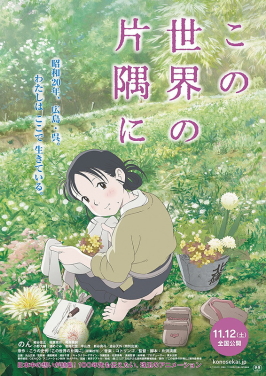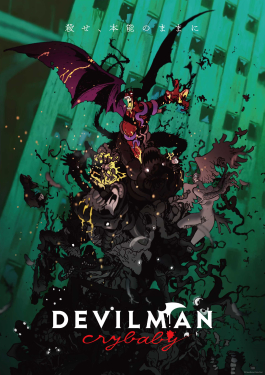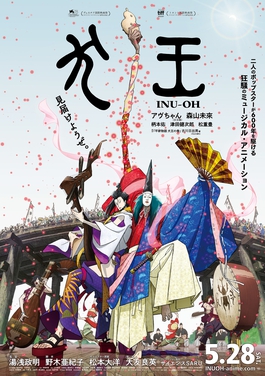
Masaaki Yuasa is a Japanese director, screenwriter, and animator affiliated with Science SARU, a Japanese animation studio which he co-founded with producer Eunyoung Choi in 2013. Yuasa previously served as president of Science SARU, but stepped down from this role in 2020. Recognized for his idiosyncratic art style and directorial voice, Yuasa began his career as an animator on the landmark television series Chibi Maruko-chan (1990–1992) and Crayon Shin-chan (1992–present), before moving into directing with the feature film Mind Game (2004) and developing a cult appeal following.
Reiko Yoshida is a Japanese screenwriter. She has written and supervised numerous screenplays for anime series, live-action dramas and films. Her major works include Kaleido Star, Aria, Maria-sama ga Miteru, D.Gray-man, K-On!, Bakuman, and Girls und Panzer. In more recent works, she has supervised the screenplays for Majestic Prince, Non Non Biyori, A Town Where You Live, Tamako Market, Yowamushi Pedal, and Castle Town Dandelion. In films, she wrote the screenplay for The Cat Returns, the original films that would make up Digimon: The Movie, Kyoto Animation’s hit anime film A Silent Voice, and the film adaptations of Osamu Tezuka's Buddha, the second film of which was given a stamp of approval by the Dalai Lama. She wrote the story for the manga series Tokyo Mew Mew along with illustrator Mia Ikumi. Among her works, she was recognized for Best Screenplay/Original Work for Girls und Panzer at the Tokyo Anime Award Festival in 2014, and she won another Best Screenplay/Original Work award in 2017. In 2018, she wrote the screenplay for Violet Evergarden which aired on TV in Japan and is licensed by Netflix. Her latest project is the animated series The Heike Story, produced with animation studio Science Saru.

Japan Sinks is a disaster novel by Japanese writer Sakyo Komatsu, published in 1973.

Uta no Prince-sama is a Japanese multimedia franchise by Broccoli. The original game of the same name was first released on the PlayStation Portable on June 24, 2010, and since its release, the game has spawned multiple sequels and rhythm game spin-offs. The series has also been adapted into several manga series.
The Ōfuji Noburō Award is an animation award given at the Mainichi Film Awards. It is named after Japanese animator Noburō Ōfuji.

In This Corner of the World is a 2016 Japanese animated wartime drama film produced by MAPPA, co-written and directed by Sunao Katabuchi, featuring character designs by Hidenori Matsubara and music by Kotringo. The film is based on the manga of the same name written and illustrated by Fumiyo Kōno. It premiered in Japan on November 12, 2016. Animatsu Entertainment licensed the global distribution rights of the film in June 2016. Shout! Factory acquired the distribution rights for North America, with a U.S. theatrical release on August 11, 2017, co-released by Funimation Films. An extended version of the film, titled In This Corner of the World, premiered on December 20, 2019 and surpassed the extended 70mm cut of Final Yamato by five minutes to become one of the two longest theatrical animated films to date, tied with Chang'an.

"Food Chain" is the seventh episode of the sixth season of the American animated television series Adventure Time. The episode was written, storyboarded, and directed by Japanese anime director Masaaki Yuasa in cooperation with creative director Eunyoung Choi, and guest stars Regular Show storyboard artist Minty Lewis as Erin the caterpillar.
Events in 2017 in anime. This year is known as the Anime Centennial Year, and was celebrated as its 100th anniversary to commemorate the ending of the Heisei era.

Night Is Short, Walk On Girl is a 2017 Japanese animated romantic comedy film directed by Masaaki Yuasa. The film is based on the 2006 novel The Night Is Short, Walk on Girl written by Tomihiko Morimi and illustrated by Yusuke Nakamura, who also served as the film's original character designer. The film was released in North America as The Night Is Short, Walk On Girl, with a leading article added, but in other English-speaking regions without one. It has been awarded the Grand Prize for Best Animated Feature at the Ottawa International Animation Festival and the Japan Academy Prize for Animation of the Year.

Devilman Crybaby is a 2018 Japanese original net animation (ONA) series based on Go Nagai's manga series Devilman. The web anime is directed by Masaaki Yuasa, produced by Aniplex and Dynamic Planning, animated by Science SARU, and released by Netflix. Yuasa was offered the opportunity to create a Devilman project by Aniplex, and envisioned Devilman Crybaby. Announced in 2017 to mark Nagai's 50th anniversary as a creator, Crybaby was made available for worldwide streaming on January 5, 2018, as a Netflix original series.
Kensuke Ushio is a Japanese composer, rock and EBM musician. He also releases work under the moniker Agraph.

Science Saru, Inc., stylized as Science SARU, is a Japanese animation studio headquartered in Kichijōji, Tokyo. Established on February 4, 2013, by producer Eunyoung Choi and director Masaaki Yuasa, the studio has produced four feature films and five animated series, as well as co-productions, a compilation film, and episodes of series for other studios. Science Saru's first animation was the "Food Chain" episode of the American animated series Adventure Time (2014); its most recent projects are the animated feature film Inu-Oh (2021), two short films for the animated anthology project Star Wars: Visions (2021), and the animated series The Heike Story (2021), Yurei Deco (2022), and Scott Pilgrim Takes Off (2023).

Ride Your Wave is a 2019 Japanese animated romantic fantasy film produced by Science Saru and directed by Masaaki Yuasa. The film premiered at the Annecy International Animated Film Festival on June 10, 2019 and was released in Japan on June 21, 2019.
Abel Góngora is a Spanish animator and director known for his work with the Japanese animation studio Science SARU. Having joined the studio as one of its first employees, Góngora serves as the head of Science SARU's digital animation department and has specialized in the use of Adobe Animate. In addition to his work as an animator, Góngora has also served as an episode director for promotional episodes of the American series OK K.O.! Let's Be Heroes, and as the director of T0-B1, a short film segment of the Disney+ anthology project Star Wars: Visions.
Eunyoung Choi (Korean: 최은영) is a South Korean studio executive, producer, director and animator. She is the President and CEO of Science Saru, a Japanese animation studio which she co-founded with Masaaki Yuasa in 2013, and has served as producer of the company's works. In 2020, following the announcement that Yuasa would step down from an executive role at Science Saru, Choi assumed responsibility for the management of the studio. In 2021, she directed a short animated film entitled Akakiri for the short film anthology Star Wars: Visions.

Super Shiro is a Japanese anime television series produced by Science SARU. A spin-off of the popular Crayon Shin-chan franchise, the series focuses on the adventures of Shiro, a seemingly-normal family dog who, when the Earth is threatened, secretly transforms into a canine superhero to protect the planet from nefarious villains. The series, consisting of 48 five-minute episodes, aired in Japan on the TV Asahi-affiliated streaming platforms AbemaTV and Telasa from October 2019 to September 2020, and was subsequently aired on Cartoon Network in Australia, India, and throughout Southeast Asia.

Inu-Oh is a 2021 Japanese animated musical film directed by Masaaki Yuasa and produced by Science SARU. Based upon the novel Tales of the Heike: Inu-Oh by Hideo Furukawa, the film is set in 14th century Japan and centers on the friendship between Inu-Oh, a dancer born with unique physical characteristics, and Tomona, a blind musician. Ostracized by society due to their physical differences, Inu-Oh and Tomona nonetheless utilize their artistic abilities to propel themselves to stardom.
Star Twinkle Pretty Cure the Movie: These Feeling within The Song of Stars is a 2019 Japanese animated action fantasy film based on the Pretty Cure franchise created by Izumi Todo, and its sixteenth series, Star Twinkle PreCure. The film is directed by Yuta Tanaka, written by Jin Tanaka, and produced by Toei Animation. The film was released in Japan on October 19, 2019.
Shinya Ohira is a Japanese animator, director and character designer. He is known for his animation style with constantly shifting linework, described as being both realistic and surreal. He is part of the animator circle Studio Break, along with animators like Atsushi Yano and Shinji Hashimoto. He has worked on several Studio Ghibli films, with Hayao Miyazaki even storyboarding certain scenes with Ohira in mind for the animation.











